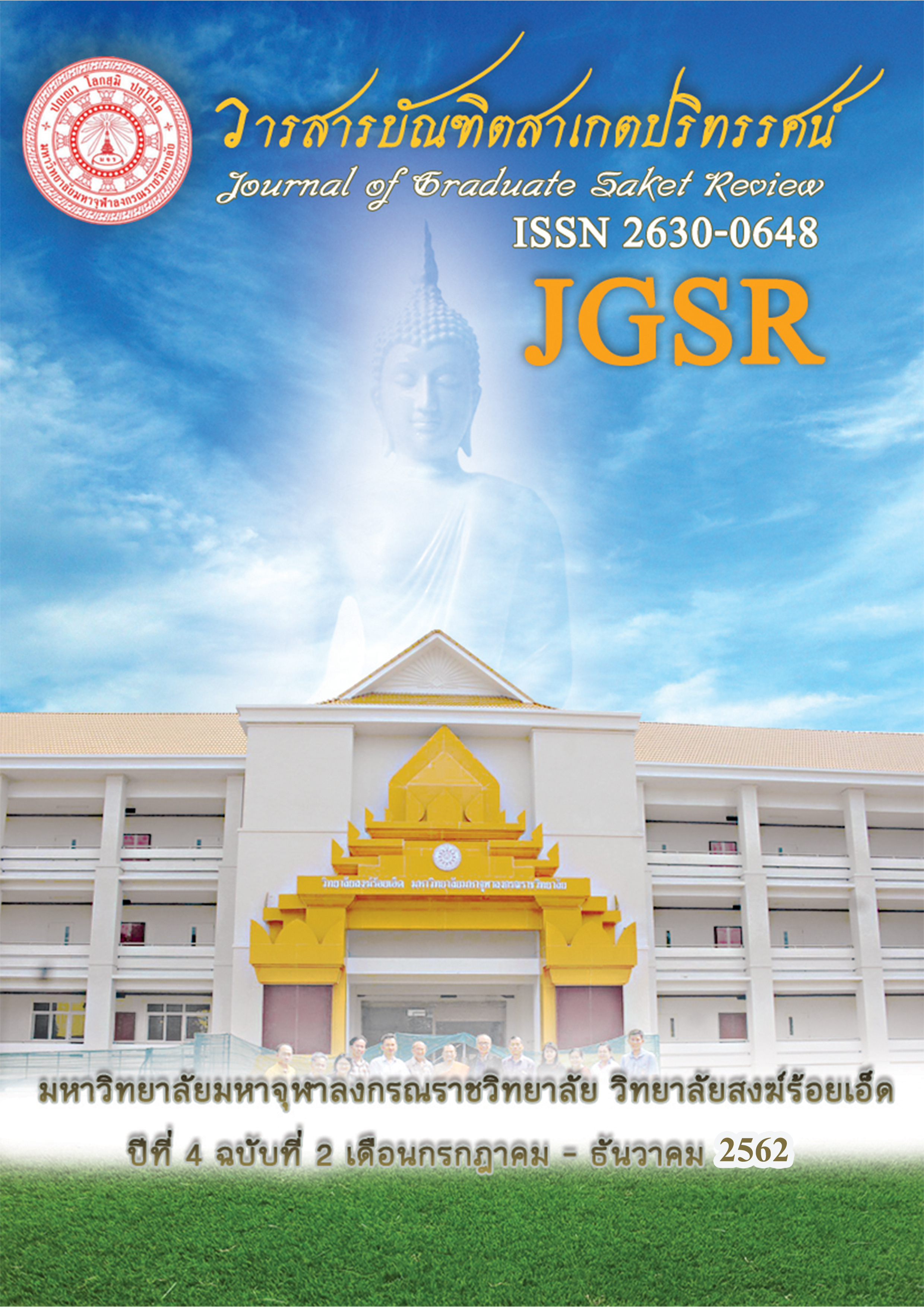ศึกษาการพัฒนามนุษย์ตามหลักฆราวาสธรรมในพุทธปรัชญาเถรวาท
Main Article Content
บทคัดย่อ
วิทยานิพนธ์นี้มีวัตถุประสงค์ 1) เพื่อศึกษาการพัฒนามนุษย์ในพุทธปรัชญาเถรวาท 2) เพื่อศึกษาหลักฆราวาส ธรรมในพุทธปรัชญาเถรวาท และ 3) เพื่อศึกษาการพัฒนามนุษย์ตามหลักฆราวาสธรรมในพุทธปรัชญาเถรวาท โดยใช้วิธีวิจัยเอกสาร คือ ศึกษาค้นคว้าจากคัมภีร์ทางพระพุทธศาสนา งานวิจัยที่เกี่ยวข้อง และตำราอื่น ๆ ประกอบ
ผลการวิจัยพบว่า การพัฒนา คือ การทำให้เจริญขึ้น ทำให้รุ่งเรืองขึ้น ใช้ได้ทั้งการพัฒนาวัตถุและพัฒนาจิตใจ เช่น การพัฒนาชนบท การพัฒนาประเทศ การพัฒนาสติปัญญา และการพัฒนาจิต เป็นต้น ซึ่งตามหลักการของพระพุทธศาสนา การพัฒนาจะต้องดำเนินไปพร้อม ๆ กัน 4 ทาง คือ การพัฒนาทางด้านกายภาพ การพัฒนาศีลธรรมหรือการพัฒนาสังคม การพัฒนาทางด้านจิตใจ และการพัฒนาทางด้านปัญญา
ฆราวาสธรรมเป็นหลักธรรมสำหรับฆราวาสธรรมสำหรับการครองเรือน หลักการครองชีวิตของคฤหัสถ์ 4 ประการ ได้แก่ สัจจะ คือ ความซื่อสัตย์จริงใจต่อกันเป็นหลักสำคัญที่จะให้เกิดความไว้วางใจและไมตรีจิตสนิทต่อกัน ทมะ คือ การรู้จักบังคับควบคุมอารมณ์ข่มใจระงับความรู้สึกต่อเหตุบกพร่องของกันและกันรู้จักฝึกฝนปรับปรุงตนแก้ไข ข้อบกพร่องปรับนิสัยและอัธยาศัยให้กลมกลืนประสานเข้าหากันได้ ขันติ คือ ความอดทนอดกลั้นต่อความหนักและความร้ายแรงทั้งหลาย จาคะ คือ ความเสียสละความเผื่อแผ่แบ่งปันตลอดถึงความมีน้ำใจเอื้อเฟื้อต่อกัน
การพัฒนามนุษย์ตามหลักฆราวาสธรรม 4 ประการ ได้แก่ สัจจะ ทมะ ขันติ และจาคะ เพื่อมุ่งหมายให้ประชาชนทั่วไปใช้ในชีวิตการครองเรือน ทั้งหมดยึดถือเป็นคุณธรรมพื้นฐานของจิตใจในการที่จะสร้างความสัมพันธ์อันดีงามกับ คนทั้งหลายที่จะอยู่ร่วมหรือติดต่อเกี่ยวข้องกันให้เหมาะสมตามฐานะนั้น ๆ เพื่อประโยชน์สุขทั้งแก่ชีวิตของตนเองและแก่ชีวิตของคนอื่น ๆ ในสังคม
Article Details
เนื้อหาและข้อมูลในบทความที่ลงตีพิมพ์ในวารสารบัณฑิตสาเกตปริทรรศน์ ถือเป็นข้อคิดเห็นและความรับผิดชอบของผู้เขียนบทความโดยตรงซึ่งกองบรรณาธิการวารสาร ไม่จำเป็นต้องเห็นด้วย หรือร่วมรับผิดชอบใด ๆบทความ ข้อมูล เนื้อหา รูปภาพ ฯลฯ ที่ได้รับการตีพิมพ์ในวารสารบัณฑิตสาเกตปริทรรศน์ ถือเป็นลิขสิทธิ์ของวารสารบัณฑิตสาเกตปริทรรศน์ หากบุคคลหรือหน่วยงานใดต้องการนำทั้งหมดหรือส่วนหนึ่งส่วนใดไปเผยแพร่ต่อหรือเพื่อกระทำการใด ๆ จะต้องได้รับอนุญาตเป็นลายลักอักษรจากวารสารบัณฑิตสาเกตปริทรรศน์ ก่อนเท่านั้น
เอกสารอ้างอิง
นวลคา จันภา. (2548). การศึกษาและสาระสำคัญของชีวิต. กรุงเทพมหานคร: อมรินทร์พริ้นติ้งแอนด์
พับลิชชิ่ง.
ปิ่น มุทุกันต์. (2535). พุทธศาสตร์ (ภาค 2). กรุงเทพมหานคร: โรงพิมพ์มหามงกุฏราชวิทยาลัย.
พระธรรมปิฎก (ป.อ. ปยุตฺโต). (2544). พุทธธรรม (ฉบับเดิม). กรุงเทพมหานคร : สานักพิมพ์ธรรมสภา.
พระพรหมคุณาภรณ์ (ป.อ. ปยุตฺโต). (2545). พจนานุกรมพุทธศาสน์ ฉบับประมวลธรรม. กรุงเทพมหานคร : บริษัทสื่อตะวัน จำกัด.
วศิน อินทสระ. (2519). พุทธปรัชญาเถรวาท. กรุงเทพมหานคร : โรงพิมพ์เจริญกิจ.


